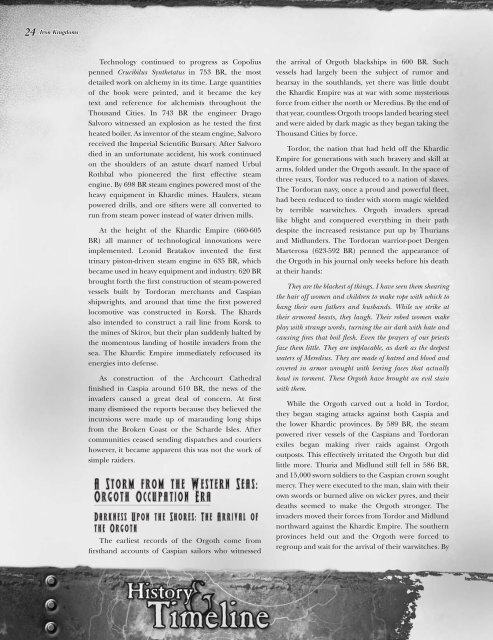02 - Iron Kingdoms W.. - Captain Spud Is Amazing
02 - Iron Kingdoms W.. - Captain Spud Is Amazing
02 - Iron Kingdoms W.. - Captain Spud Is Amazing
You also want an ePaper? Increase the reach of your titles
YUMPU automatically turns print PDFs into web optimized ePapers that Google loves.
108.1.141.197<br />
24 <strong>Iron</strong> <strong>Kingdoms</strong><br />
Technology continued to progress as Copolius<br />
penned Crucibilus Synthetatus in 753 BR, the most<br />
detailed work on alchemy in its time. Large quantities<br />
of the book were printed, and it became the key<br />
text and reference for alchemists throughout the<br />
Thousand Cities. In 743 BR the engineer Drago<br />
Salvoro witnessed an explosion as he tested the first<br />
heated boiler. As inventor of the steam engine, Salvoro<br />
received the Imperial Scientific Bursary. After Salvoro<br />
died in an unfortunate accident, his work continued<br />
on the shoulders of an astute dwarf named Urbul<br />
Rothbal who pioneered the first effective steam<br />
engine. By 698 BR steam engines powered most of the<br />
heavy equipment in Khardic mines. Haulers, steam<br />
powered drills, and ore sifters were all converted to<br />
run from steam power instead of water driven mills.<br />
At the height of the Khardic Empire (660-605<br />
BR) all manner of technological innovations were<br />
implemented. Leonid Bratakov invented the first<br />
trinary piston-driven steam engine in 635 BR, which<br />
became used in heavy equipment and industry. 620 BR<br />
brought forth the first construction of steam-powered<br />
vessels built by Tordoran merchants and Caspian<br />
shipwrights, and around that time the first powered<br />
locomotive was constructed in Korsk. The Khards<br />
also intended to construct a rail line from Korsk to<br />
the mines of Skirov, but their plan suddenly halted by<br />
the momentous landing of hostile invaders from the<br />
sea. The Khardic Empire immediately refocused its<br />
energies into defense.<br />
As construction of the Archcourt Cathedral<br />
finished in Caspia around 610 BR, the news of the<br />
invaders caused a great deal of concern. At first<br />
many dismissed the reports because they believed the<br />
incursions were made up of marauding long ships<br />
from the Broken Coast or the Scharde <strong>Is</strong>les. After<br />
communities ceased sending dispatches and couriers<br />
however, it became apparent this was not the work of<br />
simple raiders.<br />
A Storm from the Western Seas:<br />
Orgoth Occupation Era<br />
Darkness Upon the Shores: The Arrival of<br />
the Orgoth<br />
The earliest records of the Orgoth come from<br />
firsthand accounts of Caspian sailors who witnessed<br />
the arrival of Orgoth blackships in 600 BR. Such<br />
vessels had largely been the subject of rumor and<br />
hearsay in the southlands, yet there was little doubt<br />
the Khardic Empire was at war with some mysterious<br />
force from either the north or Meredius. By the end of<br />
that year, countless Orgoth troops landed bearing steel<br />
and were aided by dark magic as they began taking the<br />
Thousand Cities by force.<br />
Tordor, the nation that had held off the Khardic<br />
Empire for generations with such bravery and skill at<br />
arms, folded under the Orgoth assault. In the space of<br />
three years, Tordor was reduced to a nation of slaves.<br />
The Tordoran navy, once a proud and powerful fleet,<br />
had been reduced to tinder with storm magic wielded<br />
by terrible warwitches. Orgoth invaders spread<br />
like blight and conquered everything in their path<br />
despite the increased resistance put up by Thurians<br />
and Midlunders. The Tordoran warrior-poet Dergen<br />
Marterosa (623-592 BR) penned the appearance of<br />
the Orgoth in his journal only weeks before his death<br />
at their hands:<br />
They are the blackest of things. I have seen them shearing<br />
the hair off women and children to make rope with which to<br />
hang their own fathers and husbands. While we strike at<br />
their armored beasts, they laugh. Their robed women make<br />
play with strange words, turning the air dark with hate and<br />
causing fires that boil flesh. Even the prayers of our priests<br />
faze them little. They are implacable, as dark as the deepest<br />
waters of Meredius. They are made of hatred and blood and<br />
covered in armor wrought with leering faces that actually<br />
howl in torment. These Orgoth have brought an evil stain<br />
with them.<br />
While the Orgoth carved out a hold in Tordor,<br />
they began staging attacks against both Caspia and<br />
the lower Khardic provinces. By 589 BR, the steam<br />
powered river vessels of the Caspians and Tordoran<br />
exiles began making river raids against Orgoth<br />
outposts. This effectively irritated the Orgoth but did<br />
little more. Thuria and Midlund still fell in 586 BR,<br />
and 15,000 sworn soldiers to the Caspian crown sought<br />
mercy. They were executed to the man, slain with their<br />
own swords or burned alive on wicker pyres, and their<br />
deaths seemed to make the Orgoth stronger. The<br />
invaders moved their forces from Tordor and Midlund<br />
northward against the Khardic Empire. The southern<br />
provinces held out and the Orgoth were forced to<br />
regroup and wait for the arrival of their warwitches. By


